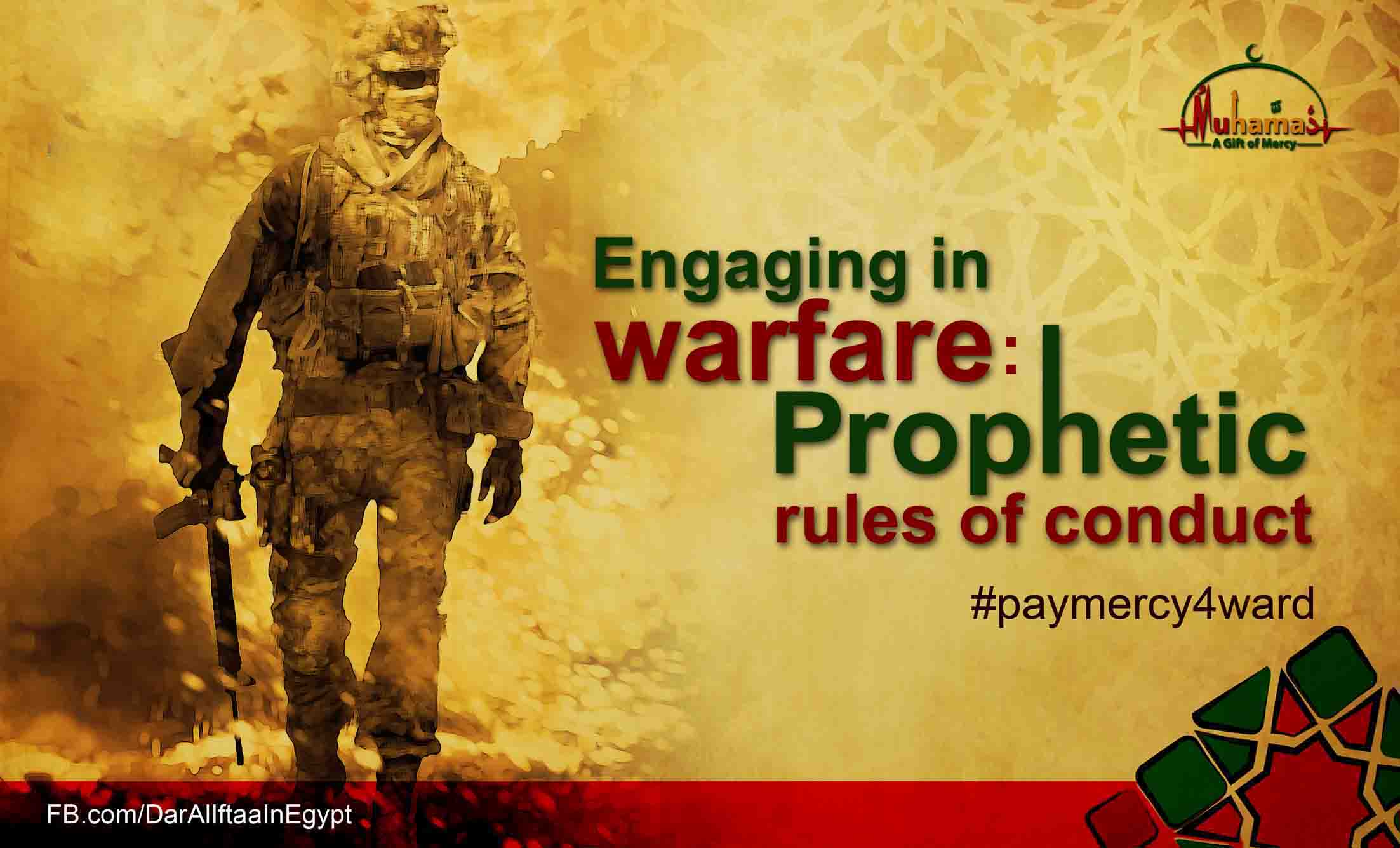Engaging in Warfare: Prophetic Rules of Conduct

War is bloody and brutal which customarily brings out the most savage of qualities in human beings. These realities are attested to by our collective history as human beings, the annals of history are replete with stories of slaughter, bloodshed, and the senseless murder of innocent children and women, often on a mass scale. Perhaps that is why, in the last century, a time during which man has supposedly become more civilized, the Nations of the world have agreed to a set of conventions that are intended to improve the situation of belligerents and civillians during times of war. Needless to say these conventions have been, and continue to be ignored by warring nations.
While the Geneva Convention is only a recent phenomenon, merciful and humane rules governing warfare were established over fourteen centuries ago. Those rules were established in the Quran and the Sunnah of the Prophet (peace and blessings be upon him) and as such, they became a part of Islamic way.
To be sure, just wars have a legitimate place in the life of Muslims. Nonetheless, those wars must be waged based on a set of humane and merciful rules that are mentioned in a general way in the Quran and in a more detailed manner in the Sunnah of the Prophet. In the Quran God says, “And fight in the way of God those who fight you but do not transgress the limits. Truly God likes not the transgressors” (2:190)
The phrase “but do not transgress the limits” refers to a myriad of forbidden crimes of war: mutilating enemy soldiers; stealing from the spoils of war; killing women, children and old men or killing monks worshipping in monasteries.
“But do not transgress the limits” further encompasses a number of other forbidden actions as well, such as killing an animal for no good reason, burning trees, destroying crops, ruining or polluting water sources, destroying houses or in a more general sense, destroying the infrastructure of enemy territory.
During one of the battles, the Prophet (peace be upon him) fought in, a dead woman was found on the battlefield. Upon seeing her, the Prophet made it clear to his companions that it was forbidden to kill women and children. Also whenever the Prophet (peace be upon him) would appoint a man to lead an army or a unit of fighters, he would advise them to fear God and provide them with a set of guidelines for war engagement.
One of the most important rules which govern just Islamic warfare is that Muslims must not be treacherous or in other words, they must fulfill terms of the treaties they agree to with enemy forces. God says in the Quran, “If you (O Muhammad) fear treachery from any people, return back their covenant to them so as to be on equal terms that there will be no more covenant between you and them. Certainly Allah likes not the treacherous” (8:58)
So, based on the meaning of this verse, if a peace treaty exists between Muslims and other people, it is strictly forbidden for Muslims to betray the terms of that treaty. Muslims are not allowed to launch any strikes against their enemy until the treaty expires. That being said, the verse further explains that if Muslims fear that the enemy is planning to violate on existing peace treaty, if trustworthy sources reported that the enemy is planning a surprise attack, they may as a defensive measure, declare the treaty to be null and void. In such instances, because the enemy does not openly declare their treacherous intentions, Muslims may not go ahead and launch a surprise attack rather they must openly declare to the enemy that the treaty between them is null and void so that both opposing forces can in a fair manner, possess equal knowledge about the resumption of hostilities between them.
Finally the above mentioned verse makes it clear that if Muslims do not fear treachery from the enemy or in other words, if there is no indication that the enemy is plotting treachery, it is not permissible for them to violate the term of their peace treaty; rather they must honor the treaty until it expires.
Sulaiman ibn ‘Amir reported that Mu’awiyah had agreed to a peace treaty with the Romans and that when the treaty was about to expire, Mu’awiyah set out with an army towards Roman lands, hoping that his arrival to the enemy’s land would coincide with the expiration of the treaty. As Mu’awiyah’s army drew nearer to enemy territory, a man appeared before the Muslim soldiers and yelled out to the advancing Muslim soldiers, “Allah is the Greatest. Honor your treaty and do not act treacherously.”
Amr was upset about the invasion even though the treaty between Mu’awiyah and the Romans was about to expire. The reason for his anger was that Mu’awiyah had set out for war while the treaty was still in effect. Therefore it does not matter if Mu’awiyah arrived in enemy territory after the treaty was expired, what mattered was that an act of war- Mu’awiyah’s departure with his soldiers took place while the treaty was still valid.
Mu’awiyah complied with ‘Amr warning and abandoned his plan to continue marching to the Romans and returned back with his army to Muslim lands. This was the strictness with which Muslims adhered to the treaties that existed between them and their enemies. Muslim commanders were determined to follow the Sunnah of the Prophet wholeheartedly by being fair to their enemies and by following just rules of Islamic warfare and by honoring their treaties.
Source: “A Mercy to the Universe” by Sa’eed ‘Ali Al- Qahtani
 Arabic
Arabic French
French Deutsch
Deutsch Urdu
Urdu Pashto
Pashto Swahili
Swahili Hausa
Hausa
